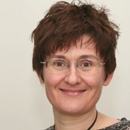Academic Editors
The following people constitute the Editorial Board of Academic Editors for PeerJ. These active academics are the Editors who seek peer reviewers, evaluate their responses, and make editorial decisions on each submission to the journal. Learn more about becoming an Editor.

Martial Ndeffo
Dr. Martial Ndeffo is Assistant Professor of Epidemiology at Texas A&M College of Veterinary Medicine and Biomedical Sciences and Adjunct Assistant Professor of Epidemiology at Texas A&M School of Public Health. His research uses transdisciplinary modeling approaches to address public health challenges for a wide range of infectious diseases.

Markus A Dahlem
Currently Guest Scientist at the Department of Physics at the Humboldt University, Berlin, Germany. Member of the Cardiovascular Physics Lab. Held formerly positions in the Department of Neurology at the University of Magdeburg (Germany) and in the Department of Psychology at the University of Stirling (Scotland, UK).

Andre R Fajardo
Prof. André Ricardo Fajardo is graduated in Chemistry (2007), M.Sc. (2009) and Ph.D. (2013) degrees in Chemistry at Maringá State University (Brazil). Ph.D. with a sandwich period at CERMAV (Grenoble-France, 2012-2013). Currently, he is Professor at Universidade Federal Pelotas (Brazil). Research-leader in the Laboratory of Technology and Development of Composites and Polymeric Materials (LaCoPol). He is the author of more than 80 papers with IF and his main research interests include polymer chemistry, polymeric biomaterials, polymeric composites, natural polymers, hydrogels, and absorbent materials.

Wagner Magalhães
Oceanographer with a Ph.D. in Zoology from the University of Hawaii at Manoa, USA and currently Assistant Professor of Zoology at the Federal University of Bahia, Brazil. Research interests include benthic ecology, trophic ecology and systematics, with special focus on taxonomy of annelid polychaetes.

Chris B Zou
Professor of Watershed Hydrology and Ecohydrology at the Department of Natural Resource Ecology and Management, Oklahoma State University.

Carlos Eduardo de Rezende
Dr. Carlos Eduardo de Rezende is a Full Professor in the Environmental Sciences Laboratory of the Biosciences and Biotechnology Center at the North Fluminense State University (UENF). Prof. Rezende is a senior researcher from the Brazilian National Council for Science and Technology (CNPq) (Level 1B), Scientist of Rio de Janeiro state from Foundation for Science Development (FAPERJ) and coordinator of the Future Earth Coasts in South America. Dr. Rezende has a professional experience including studies on the dynamics in continental aquatic environments (e.g.: rivers, lakes), terrestrial and coastal ecosystems (e.g., estuaries, mangroves and lagoons) and ocean. At UENF, Prof. Rezende held various institutional leadership roles (e.g., Vice-Rector, Dean of Undergraduate Studies, Center Director and Head of Environmental Sciences Laboratory), and he has participated in several boards and councils. Actually, Prof. Rezende is conducting studies on Hg and inorganic (e.g.: Al, Fe, Mn, carbonate) and organic geochemical supports (e.g. elemental and isotopic composition) as well as their ecosystem interactions; use of molecular markers (e.g., lignin phenols, carbon black) as geochemical tools to enhance the understanding on the alterations of biogeochemical cycles in the transition between terrestrial and aquatic environments.

Jennifer Rodger
Associate Professor and NHMRC Senior Research Fellow at the University of Western Australia. BScHons in Biochemistry at the University of Bath, UK, PhD in Molecular Neuroscience at the University Pierre et Marie Curie, France. She currently leads a research team investigating mechanisms of brain plasticity. Her most recent work focuses on the use of non-invasive brain stimulation to promote morphological and functional repair of injured and abnormal brain circuits and restore normal behaviour.

Andrea Sundermann
Primary research interests: Effects of stream restoration on aquatic organisms, dispersal of aquatic insects, environmental factors controlling establishment of aquatic organisms in near natural, restored and degraded rivers, threshold values of physico-chemical variables controlling benthic invertebrate occurrences.

Maria A. Deli
Scientific advisor at the Institute of Biophysics, Biological Research Centre of the Hungarian Academy of Sciences in Szeged, Hungary. Head of the Biological Barriers Research Group. Honorary professor at the University of Szeged.

Francesco Savino
Professor at the school of Pediatrics - Univ. Turin. Studying nutrition, metabolism of infancy in particular hormones such as Leptin, IGF-1, Ghrelin, Adiponectin. Takes interest in gastrointestinal and nutritional disorders. He studies in detail some aspects of gut microbiota of colicky infants such low level of lactobacilli and increased concentration of E.Coli. Performed relevant research on the effect of probiotics on colicky infants. Author of more than 120 scientific reports.

Melanie Kah
Melanie Kah graduated with a MSc in Agronomy and Soil Sciences (University of Nancy, France), before completing her PhD on the fate of ionisable pesticides in soils (University of York, UK). She was then recruited by the UK Food and Environmental Research Agency (FERA), where she assessed the exposure and hazard of a wide range of contaminants, within projects commissioned by government and industry. In 2009, Melanie moved to the University of Vienna (Austria), where she developed projects looking at the interactions between organic contaminants and natural/engineered nanoparticles. Melanie was a Distinguished Visitor at the CSIRO Land and Water in 2018 (Adelaide, Australia), before joining the School of Environment at the University of Auckland (New Zealand) in 2019.

Charles D Johnson
Dr. Johnson earned his BS and PhD from Texas A&M University, with an intermediate MS degree from Clemson University. He completed a postdoc at the University of Louisville, leading to his role as associate director of bioinformatics for the Center for Genetics and Molecular Medicine at the same institution. He played a foundational role in creating the statistics and bioinformatics division at Ambion/Asuragen Inc. Following this, Dr. Johnson founded BioMath Solutions LLC, a bioinformatics-focused startup specializing in software development for genomic technology firms.
Presently, Dr. Johnson serves as the Director of Genomics and Bioinformatics Service at Texas A&M AgriLife.

